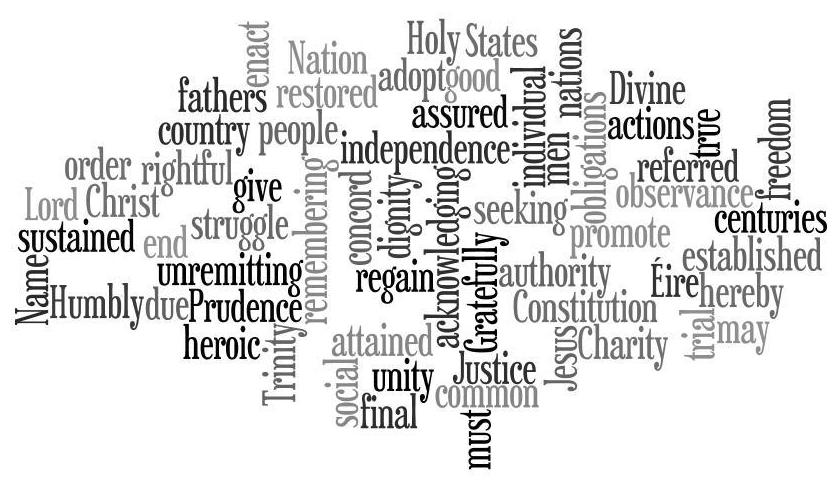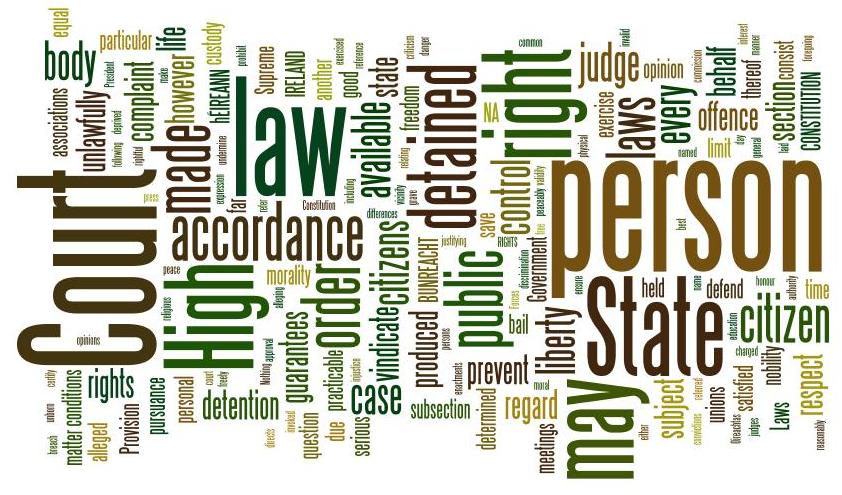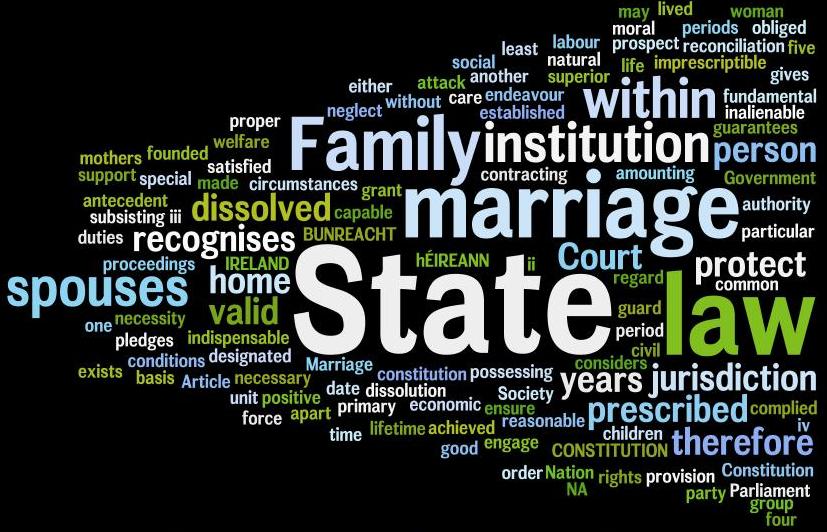The Constitution of Ireland.
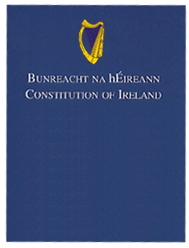
The Constitution of Ireland replaced the Constitution of the Irish Free State which had been in effect since the independence of the Free State from the United Kingdom on 6 December 1922.
There were two main motivations for replacing the constitution in 1937:
Firstly, the Statute of Westminster 1931 granted parliamentary autonomy to the six U.K. Dominions within a Commonwealth of Nations. The Irish Free State constitution of 1922 was, in the eyes of many, associated with the still controversial Anglo-Irish Treaty. The largest political group in the anti-treaty faction, who opposed the treaty initially by force of arms, had boycotted the institutions of the new Irish Free State until 1926. In 1932 they were elected into power as the Fianna Fáil party. Since 1932, under the provisions of the Statute, some of the articles of the Constitution of the Irish Free State required by the Anglo-Irish Treaty, had been dismantled by acts of the Dail. Such amendments had removed references to the Oath of Allegiance, appeals to the Privy Council, the British Crown and the Governor General. The sudden abdication of Edward VIII in December 1936 was quickly used to redefine the royal connection. Nevertheless, the Fianna Fáil government, led by Éamon de Valera, still desired to replace the constitutional document they saw as having been imposed by the U.K. government in 1922.
The second motive for replacing the original constitution was primarily symbolic. De Valera, an obscurantist political strategist, wanted to put an Irish cultural stamp on the institutions of government, and chose to do this in part via an obscure doctrine known as constitutional autochthony.
There were two main motivations for replacing the constitution in 1937:
Firstly, the Statute of Westminster 1931 granted parliamentary autonomy to the six U.K. Dominions within a Commonwealth of Nations. The Irish Free State constitution of 1922 was, in the eyes of many, associated with the still controversial Anglo-Irish Treaty. The largest political group in the anti-treaty faction, who opposed the treaty initially by force of arms, had boycotted the institutions of the new Irish Free State until 1926. In 1932 they were elected into power as the Fianna Fáil party. Since 1932, under the provisions of the Statute, some of the articles of the Constitution of the Irish Free State required by the Anglo-Irish Treaty, had been dismantled by acts of the Dail. Such amendments had removed references to the Oath of Allegiance, appeals to the Privy Council, the British Crown and the Governor General. The sudden abdication of Edward VIII in December 1936 was quickly used to redefine the royal connection. Nevertheless, the Fianna Fáil government, led by Éamon de Valera, still desired to replace the constitutional document they saw as having been imposed by the U.K. government in 1922.
The second motive for replacing the original constitution was primarily symbolic. De Valera, an obscurantist political strategist, wanted to put an Irish cultural stamp on the institutions of government, and chose to do this in part via an obscure doctrine known as constitutional autochthony.
The Constitution of Ireland 1937, Click here
The Preamble
Article 40 [Fundamental Rights]
Article 41 [Family]
Article 42 [Education]
Constitutional Amendments.
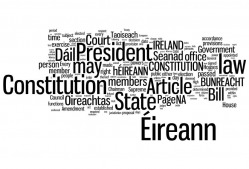
First Amendment of the Constitution Act, 1939 [Extended to conflicts in which the State is not a participant the provision for a state of emergency to secure the public safety and preservation of the State in time of war or armed rebellion.]
2 September, 1939
Second Amendment of the Constitution Act, 1941 [An omnibus proposal, covering a range of disparate Articles, aimed at tidying up the Constitution in the light of experience since its enactment.]
30 May, 1941
Third Amendment of the Constitution Act, 1972 [Allowed the State to become a member of the European Communities.]
8 June, 1972
Fourth Amendment of the Constitution Act, 1972 [Reduced the minimum voting age at Dáil and Presidential elections and referendums from 21 years to 18 years.]
5 January, 1973
Fifth Amendment of the Constitution Act, 1972 [Removed from the Constitution the special position of the Catholic Church and the recognition of other named religious denominations.]
5 January, 1973
Sixth Amendment of the Constitution (Adoption) Act, 1979 [Ensured that adoption orders made by the Adoption Board could not be declared invalid because they were not made by a court.]
3 August, 1979
Seventh Amendment of the Constitution (Election of Members of Seanad Éireann by Institutions of Higher Education) Act, 1979 [Provided for the election of members of Seanad Éireann by universities and other institutions of higher education.]
3 August, 1979
Eighth Amendment of the Constitution Act, 1983 [Acknowledged the right to life of the unborn, with due regard to the equal right to life of the mother.]
7 October, 1983
Ninth Amendment of the Constitution Act, 1984 [Extended the right to vote at Dáil elections to certain non-Irish nationals.]
2 August, 1984
Tenth Amendment of the Constitution Act, 1987 [Allowed the State to ratify the Single European Act.]
22 June, 1987
Eleventh Amendment of the Constitution Act, 1992 [Allowed the State to ratify the Treaty on European Union (Maastricht) and to become a member of that union.]
16 July, 1992
There is no Twelfth Amendment. On 25 November 1992, three proposals were put to the people, the Twelfth, Thirteenth and Fourteenth Amendments. The people rejected the Twelfth (which dealt with the right to life of the unborn) and approved the Thirteenth and Fourteenth (below).
Thirteenth Amendment of the Constitution Act, 1992 [Provided that Article 40.3.3° (the right to life of the unborn) would not limit freedom to travel between Ireland and another state]
23 December, 1992
Fourteenth Amendment of the Constitution Act, 1992 [ Provided that Article 40.3.3° ( the right to life of the unborn) would not limit freedom to obtain or make available information relating to services lawfully available in another state.]
23 December, 1992
Fifteenth Amendment of the Constitution Act, 1995 [ Provided for the dissolution of marriage in certain specified circumstances.]
17 June 1996
Sixteenth Amendment of the Constitution Act, 1996 [Provided for the refusal to bail by a court to a person charged with a serious offence where it is reasonably considered necessary to prevent the commission of a serious offence by that person.]
12 December, 1996
Seventeenth Amendment of the Constitution Act, 1997 [Provided that the confidentiality of discussions at meetings of the Government would be respected save only where the High Court, in certain specified circumstances, determined that disclosure should be made]
14 November, 1997
Eighteenth Amendment of the Constitution Act, 1998 [Allowed the State to ratify the Treaty of Amsterdam.]
3 June, 1998
Nineteenth Amendment of the Constitution Act, 1998 [Allowed the State to consent to be bound by the British-Irish Agreement done at Belfast on 10 April 1998 and provided that certain further amendments to the Constitution, notably to Articles 2 and 3, would come into
effect when that agreement entered into force.]
3 June, 1998
Twentieth Amendment of the Constitution Act, 1999 [Provided constitutional recognition of the role of local government and that local elections are held at least every five years.]
23 June, 1999
Twenty-first Amendment of the Constitution Act, 2001 [Prohibition of death penalty and removal of references to death penalty]
27 March, 2002
There is no Twenty–second Amendment of the Constitution. The Twenty–second Amendment of the Constitution Bill, 2001 [relating to the removal of a judge from office and providing for a body to be established by law to investigate or cause to be investigated conduct constituting misbehaviour by a judge or affected by incapacity of a judge] was not passed by the Houses of the Oireachtas.
Twenty–third Amendment of the Constitution Act, 2001 [Allowing the State to ratify the Rome Statute of the International Criminal Court].
27 March, 2002
There is no Twenty-fourth Amendment of the Constitution . On 7 June, 2001, three proposals were put to the people, the Twenty-first, Twenty-third and Twenty-fourth Amendments. The people rejected the Twenty-fourth (which dealt with the Treaty of Nice) and approved the Twenty-first and Twenty-third (above).
2 September, 1939
Second Amendment of the Constitution Act, 1941 [An omnibus proposal, covering a range of disparate Articles, aimed at tidying up the Constitution in the light of experience since its enactment.]
30 May, 1941
Third Amendment of the Constitution Act, 1972 [Allowed the State to become a member of the European Communities.]
8 June, 1972
Fourth Amendment of the Constitution Act, 1972 [Reduced the minimum voting age at Dáil and Presidential elections and referendums from 21 years to 18 years.]
5 January, 1973
Fifth Amendment of the Constitution Act, 1972 [Removed from the Constitution the special position of the Catholic Church and the recognition of other named religious denominations.]
5 January, 1973
Sixth Amendment of the Constitution (Adoption) Act, 1979 [Ensured that adoption orders made by the Adoption Board could not be declared invalid because they were not made by a court.]
3 August, 1979
Seventh Amendment of the Constitution (Election of Members of Seanad Éireann by Institutions of Higher Education) Act, 1979 [Provided for the election of members of Seanad Éireann by universities and other institutions of higher education.]
3 August, 1979
Eighth Amendment of the Constitution Act, 1983 [Acknowledged the right to life of the unborn, with due regard to the equal right to life of the mother.]
7 October, 1983
Ninth Amendment of the Constitution Act, 1984 [Extended the right to vote at Dáil elections to certain non-Irish nationals.]
2 August, 1984
Tenth Amendment of the Constitution Act, 1987 [Allowed the State to ratify the Single European Act.]
22 June, 1987
Eleventh Amendment of the Constitution Act, 1992 [Allowed the State to ratify the Treaty on European Union (Maastricht) and to become a member of that union.]
16 July, 1992
There is no Twelfth Amendment. On 25 November 1992, three proposals were put to the people, the Twelfth, Thirteenth and Fourteenth Amendments. The people rejected the Twelfth (which dealt with the right to life of the unborn) and approved the Thirteenth and Fourteenth (below).
Thirteenth Amendment of the Constitution Act, 1992 [Provided that Article 40.3.3° (the right to life of the unborn) would not limit freedom to travel between Ireland and another state]
23 December, 1992
Fourteenth Amendment of the Constitution Act, 1992 [ Provided that Article 40.3.3° ( the right to life of the unborn) would not limit freedom to obtain or make available information relating to services lawfully available in another state.]
23 December, 1992
Fifteenth Amendment of the Constitution Act, 1995 [ Provided for the dissolution of marriage in certain specified circumstances.]
17 June 1996
Sixteenth Amendment of the Constitution Act, 1996 [Provided for the refusal to bail by a court to a person charged with a serious offence where it is reasonably considered necessary to prevent the commission of a serious offence by that person.]
12 December, 1996
Seventeenth Amendment of the Constitution Act, 1997 [Provided that the confidentiality of discussions at meetings of the Government would be respected save only where the High Court, in certain specified circumstances, determined that disclosure should be made]
14 November, 1997
Eighteenth Amendment of the Constitution Act, 1998 [Allowed the State to ratify the Treaty of Amsterdam.]
3 June, 1998
Nineteenth Amendment of the Constitution Act, 1998 [Allowed the State to consent to be bound by the British-Irish Agreement done at Belfast on 10 April 1998 and provided that certain further amendments to the Constitution, notably to Articles 2 and 3, would come into
effect when that agreement entered into force.]
3 June, 1998
Twentieth Amendment of the Constitution Act, 1999 [Provided constitutional recognition of the role of local government and that local elections are held at least every five years.]
23 June, 1999
Twenty-first Amendment of the Constitution Act, 2001 [Prohibition of death penalty and removal of references to death penalty]
27 March, 2002
There is no Twenty–second Amendment of the Constitution. The Twenty–second Amendment of the Constitution Bill, 2001 [relating to the removal of a judge from office and providing for a body to be established by law to investigate or cause to be investigated conduct constituting misbehaviour by a judge or affected by incapacity of a judge] was not passed by the Houses of the Oireachtas.
Twenty–third Amendment of the Constitution Act, 2001 [Allowing the State to ratify the Rome Statute of the International Criminal Court].
27 March, 2002
There is no Twenty-fourth Amendment of the Constitution . On 7 June, 2001, three proposals were put to the people, the Twenty-first, Twenty-third and Twenty-fourth Amendments. The people rejected the Twenty-fourth (which dealt with the Treaty of Nice) and approved the Twenty-first and Twenty-third (above).
